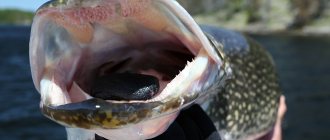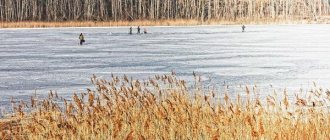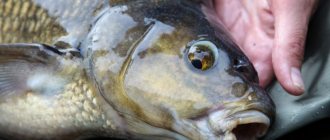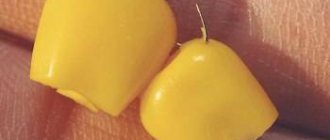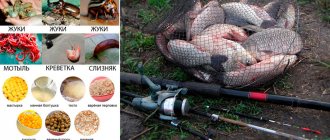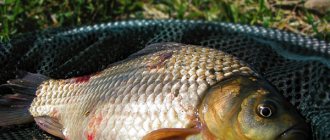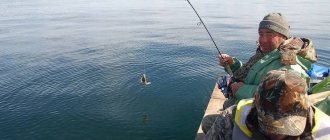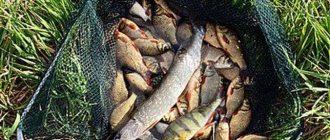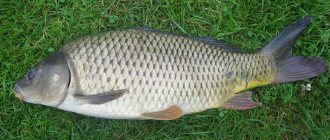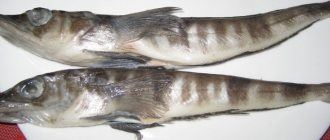Are the fish feeding today?
Is it caught by other anglers? If you don’t have the opportunity to see with your own eyes how other fishermen are succeeding in fishing, then all that remains is to pay attention to the following factors:
- Perhaps the fish are now spawning (in the spring after the ice melts) after some warming of the water. All fish have different spawning times. And many of them leave the places where they feed almost all year round and go to smaller places (channels, backwaters of islands, river mouths (places where a river flows into a larger body of water). During spawning, the behavior of the fish is unpredictable and one cannot expect a stable bite has to.
- Bad weather (rain, strong wind, temperature change) also affects the fish bite in a negative way.
Why aren't our fish biting? Why doesn't it bite? 8 reasons for lack of bite and how to deal with them
Contents of the article (click to view)
Weather and fish bite
Best bite
observed in
stable weather.
In warm water
the fish digests food faster, so it
will feed more actively
(But there is one correction here: at a very high water temperature, the fish is in a semi-fainting state, which has a bad effect on the bite).
On a sunny clear day
the fish tries to stay at depth, and only the young go aground to the very shore, where the water has warmed up enough.
Light rain
may increase fish activity. The upper layers are saturated with oxygen, in addition, various food particles are washed into the water.
Wind
may complicate the fishing itself, but often it helps with the bite. The wind saturates the upper layers of water with oxygen. Ripples and waves prevent direct penetration of sunlight - the fish are less wary and can go to the shallows.
Pressure
plays a major role in changing fish activity. The best time for fishing is on the eve of a storm or before the onset of a cold front, when the barometer drops sharply.
Articles on the topic (click to view)
Smirnov Alexander Stanislavovich
Wilderness survival instructor. More than 15 years of teaching experience
Transparency
water also affects the behavior of the fish: in clear water the fish behaves more cautiously and tries to stay deeper. However, very cloudy water is not good either: it is difficult for fish to see their food.
Optimal water temperature
different for different fish. As a rule, peaceful fish, which are more thermophilic, look for the place where they are most comfortable, where they behave actively and feed with great pleasure.
Sudden changes in water level
in a reservoir have a bad effect on fish biting. When the water level slowly rises or falls, the fish can maintain their usual activity and actively feed.
Flow
helps the fish - it washes food into the pond, washes sand spits where the fish likes to stay.
What to do when the fish don't bite?
Well, when you have figured out why the fish doesn’t bite, you need to act in accordance with the prevailing circumstances.
Changing bait (nozzle)
– often gives a positive result. Try different baits, try to combine them, make “sandwiches”, change the size of the bait.
If you fish with a spinning rod, then you should experiment with the type of wiring
bait and its speed. Change baits more often, try even those you would never fish with here.
Change your fishing spot
– you need to look for the fish, perhaps it has gone to the depths or hidden in the reeds. Try to fish as many new places as possible.
If you fish with a feeder, then perhaps replacing the leash with a thinner one
will not alarm the fish and this will bring you a positive result.
Keep quiet
. Perhaps you are scaring the fish with your behavior or bright clothes.
Try to stay fishing longer
– sometimes the morning lack of bite gives way to midday gluttony.
Switch to catching a different species of fish
– if you were catching a predator, then switch to float fishing and vice versa.
Monitor the situation on the pond
– often the fish reveals its presence by splashes on the surface of the water.
Talk to other fishermen
, perhaps their fishing tactics on this day are more successful.
Conclusion:
fish are very sensitive to sudden changes in weather. Her feeding preferences may change throughout the day. If the fish doesn't bite, don't give up. Try something new, choose the best from your own and others’ experiences, and your catches are guaranteed to become heavier!
We hope that this article has revealed the main factors influencing fish bite, and now you know exactly why fish sometimes don’t bite.
For many fishing enthusiasts, the question of why the fish doesn’t bite is one of the main ones. It becomes especially acute during periods of prolonged passivity of underwater inhabitants.
It even happens that a fish walks around a pond, jumps and plays, but does not take any of the offered bait. At the same time, the echo sounder shows the presence of a good school of bream, roach or crucian carp. Let's figure out together why this happens, and what to do if none of the fishing objects want to bite.
Factors of no biting
Smirnov Alexander Stanislavovich
Wilderness survival instructor. More than 15 years of teaching experience
If the fish does not bite, then this may be a consequence of both natural factors and directly depend on human actions in the reservoir. Therefore, we will divide all the reasons for lack of biting into two large categories and make a detailed analysis of them.
It happens that upon arriving at a pond, we see fish splashing. However, having started fishing, we soon become convinced that there is no bite. Why does this happen? In some cases, this can be explained by several reasons:
- Fish hunt for insects. This is especially true during the summer mayflies. It is simply impossible to seduce an underwater inhabitant with any other bait during this period.
- During the spawning period, mating games take place, but here there is no need to sin on biting, and fishing should be stopped altogether.
- There is poor dissolved oxygen in the reservoir, and the fish just rise to breathe.
- The little thing runs away from the predator pursuing it. So, you need to switch to hunting for him.
Use different baits, baits, lures
If a fish doesn’t bite a worm, it doesn’t mean it’s not there. She may not be interested in your bait at the moment.
For animal baits, try:
- bloodworm;
- worm;
- maggot;
- fly pupae;
- Zhukov;
- live bait fish when fishing for large predatory fish.
From plant attachments:
- grains of corn, peas, pearl barley;
- dough.
In summer, fish prefer plant baits, and in spring animals. But don’t forget to try both types of baits when it doesn’t bite; there are exceptions to any rule.
Use of various attachments and baits
The fish may turn out to be from the worm (especially when it is warm or hot), so you need to resort to another option and try putting a vegetable bait on the hook. From baits of animal origin you can bait:
- Worm.
- Maggot.
- Bloodworm.
- Fly pupae.
- Various insects.
- When catching predatory fish, you can attach live bait.
The following can be used as plant attachments:
- Grains of various crops, such as wheat, peas, corn, pearl barley, etc.
- Dough (mamalygu, etc.).
In summer, fish feed more on plant foods, and in spring and autumn – on animal foods. But these rules can be violated by the fish itself, and you need to try using both baits.
Feed the fish
White fish can be baited to your place or even baited (by feeding the same place methodically over several days, preferably at the same time). In this case, the presence of a current in the reservoir will affect the speed of the effect of your bait. If there is a current, the food will be washed away by the current and the fish in a large water area will learn that a place with an abundance of food has appeared and will gradually come to this place.
You shouldn’t feed too much, especially in stagnant water, the fish will quickly get full and stop perceiving your baits and hook baits as something attractive.
The best bait mixtures:
- Dunaev
- Traper
- Sensas
- Vde
- Pelican
List of reasons why fish may not bite
Fish react sensitively to everything that happens in the aquatic and near-aquatic environment, and as a result, their level of activity changes. Veterans of fishing determine the reasons for the lack of bite very quickly, but beginners should familiarize themselves with the most well-known of them so as not to sit for hours in vain. So, the fish may not bite under the following circumstances.
- Spawning periods. You should not expect the fish to bite during this period and a couple of weeks after it. It usually depends on the temperature of the water.
- Atmosphere pressure. With significant deviations towards low or high pressure, the fish forgets about food.
At the same time, a sharp change in pressure on fish has a very strong negative effect (with the exception of predators, who hunt precisely under such weather conditions). Read about what pressure is best for fishing at the link. The fish bite at any pressure. The main thing is that it does not change sharply during the day. - Wind strength and direction. The bite will stop, as a rule, if a north or northeast wind blows; there are cases when a strong wind from the south affects it.
There will be no wind at all - the bite will disappear. A strong wind after a moderate one will lead to the fact that fishing will have to be completed. The fish bites worst when there is a northeast wind. It is best in the southwest. - Times of Day. Trying to catch fish at noon in the heat of the day is a futile exercise. Much has been written about the fact that the full moon also does not contribute to a good bite. Although some people manage to catch decent fish at this time.
- Food supply at the fishing site. This factor is very important. If natural food is present in the reservoir in a significant volume, the fish’s interest in your baits will be small.
- Mayfly butterfly during the period of mass emergence. During the period of fluttering above the water itself, it becomes a favorite delicacy of fish. At this time, your attachments are not recognized at all.
- Poplar fluff. Fishing suffers a real disaster during the period of its occurrence. Having swallowed fluff on the surface of the reservoir, she then “gets sick” for a long time, and is not interested in biting.
- Condition of gear. The main principle is that the tackle should be suitable for the fish you are trying to catch. A large hook will scare away medium and small fish, a very small hook will not hook well.
- Fisherman's behavior. Of course, loud screams, various kinds of tapping, and stomping on the shore scare away the fish. Silence should be maintained whenever possible. No unnecessary movements.
- Negative human factor. There will be no bite for a long time where they “fished” with an electric fishing rod, used explosives, and also poisoned them by adding boric acid to the bait. You shouldn’t even start fishing in muddy and smelly water.
Now that the most well-known reasons in the fishing community why fish don’t bite have been discussed, let’s move on to ways to improve the situation in a favorable direction.
Ask the fishermen
Don’t be shy about approaching anglers who are already fishing and have something in their tank, especially if they see that you’re not succeeding. Most likely, they will tell you what you are doing wrong, what they are fishing for, what they are feeding you with, and you can see the rest by following the process of catching them.
How to choose a float rod and equip it correctly - a guide for novice anglers.
Catching crucian carp on a feeder - the correct equipment and fishing process, how to catch your fishing neighbors.
Everything about carp fishing in spring and summer.
Tactical techniques. How to make fish bite?
Watching how athletes fish during the tour, you never cease to be amazed at the variety of jars, boxes and other containers with all kinds of additives. Not all of them are needed during competitions, however, according to the law of meanness, you will definitely need exactly that supplement that you forgot at home that day. After all, very often a change in weather has a negative impact on fish behavior: the fish hangs in half-water and does not particularly want to pay attention to bait and bait. It can only be stirred up with the help of various additives that affect the receptors and make the fish bite. Moreover, a similar situation arises both during competitions and during ordinary amateur fishing, and therefore stories like “I added some ingredient to the bait - and it started biting” not only take place, but also give rise to a huge number of all kinds of rumors about secret additives.
In fact, everything is much simpler. On regular recreational fishing, you do not need to keep with you all the variety of additives and flavorings on sale. They are often the very secret ingredient that can provoke even the most cautious and capricious fish to bite. That's what we'll talk about today.
Animal supplements
Did you think that we would talk exclusively about “store-bought” flavors and attractants? In no case! Just think about it - what can attract fish better than food that is familiar to it, present in large quantities in a certain place? In nature, the same bream has to look for moth after moth, swarming in the mud for a long time. A generous fisherman comes to the pond and sets a rich table with a lot of bloodworms - just some kind of holiday for the stomach! But have you ever thought that fish are attracted not only by the bloodworm itself, but also by its blood? But many bream fishermen consider this reddish-brown liquid to be the best attractant! With a weak, uncertain bite, sometimes all you need to do is put a pinch or two of bloodworms into the feeder and immediately crush it with your fingers, squeezing out the juice, which the bait will immediately absorb. As a rule, 2-3 feeders with crushed bloodworms are enough - and the bite resumes with renewed vigor.
The situation is similar with maggots. It is unlikely that you will be able to crush it with your fingers, and therefore scissors come to the rescue - both regular and with several blades, designed for cutting greenery. A handful of larvae are placed in a jar with high walls and, with the help of scissors, are turned into some kind of minced meat in a matter of seconds. It is also added with plugs to each feeder, clamping with bait on both sides. As in the case of bloodworms, if fish are present at the fishing point, sometimes 2-3 feeders are enough - and confident bites resume. It should be remembered that such minced meat is very nutritious, and therefore it should be used carefully - there is a high chance of overfeeding the fish during a period of weak bite. In addition, experienced floaters and feeders regularly practice fishing with such trimmed maggots. 2-3 larvae cling to the hook, one of which is cut with scissors already on the hook. The appetizing “slurry” flowing out of it in the water perfectly attracts large fish, primarily bream and crucian carp. Fishermen note that such a bait works flawlessly precisely during periods of weak bite: if you catch whole larvae, there are no bites. As soon as you trim the tails of one or two maggots, the tip immediately bends or the float sinks.
But with the worm the situation is somewhat different. No, fish react extremely positively to “meat” of this kind in a feeder or in a bait ball, but you should not rush to extremes. If you overdo it and turn the worm into a lump of minced meat, the situation can change exactly the opposite: it has been repeatedly noticed that fish are afraid of large amounts of juice from the worm. All the angler needs to do is cut the worm into several fairly large moving pieces. Moreover, during one of the World Feeder Championships, exactly this situation developed, and in order to attract fish to the fishing point, the worm was cut into pieces, which were immediately soaked in water. This was the only way the athletes managed to get a fish bite.
What conclusion can be drawn from the above? Fish has an extremely positive attitude towards animal additives, but even they need to be able to be presented correctly. Sometimes the fish doesn’t want a whole maggot, but the minced meat made from it is gobbled up by both cheeks. Therefore, experiments, experiments and more experiments.
Herbal supplements
Various herbal supplements also show excellent results. They work, contrary to popular belief, in cold water, and with no less efficiency. All herbal supplements can be divided into two conditional groups:
- ·Typically feed additives designed to saturate and retain fish at the fishing point. As a rule, these are all kinds of porridges and cereals - pearl barley, millet porridge, grains of canned corn and peas. Such additives should not be added directly to the bait; they are stored separately and added immediately before feeding, to each feeder or ball of food. In the case of canned corn, you can do the same with bloodworms or maggots - the grains “shredded” into minced meat perfectly attract the attention of roaches, crucian carp and bream. You should not pour the juice out of the jar - fans of river fishing note that the bait mixed with it attracts fish an order of magnitude better than those that were moistened with ordinary water.
·Additives of plant origin designed to attract fish to the fishing point with their mechanics. We are talking about various grains - hemp, sunflower, flax. Such additives are fried until cooked, and then ground in a blender. The smell from them drives not only the fish, but also the fisherman crazy. Experienced fishermen note that roasted hemp grains are the number one additive for roach, while flaxseed perfectly “collects” bream and bream.
They can be added in different ways - both into dry bait when mixing, and into a ready-to-use mixture using the same “plugs”. It should be remembered that ground grains have extremely active lifting - bait with the addition of such particles literally explodes at the bottom. Such mechanics will certainly attract the attention of small fish, if any are present in the fishing area. It is for this reason that if an angler has the task of purposefully catching large fish in places with a large amount of small fish, the use of these additives should be abandoned or large baits that will be too tough for this very small fish to be used.
Dry and liquid aromatics
Another “secret” that came from sports. Until recently, aromatics were used exclusively during the mixing of bait; they were added before the initial moistening. The main disadvantage when working with an additive like this is the impossibility of adjusting the smell during fishing. If it so happens that the fisherman did not guess correctly with the aromatics, the bait can be safely thrown away. It is for this reason that athletes suggested a radically different way of using it. Such an aroma burst into fishermen’s life aggressively and very “evilly”: until recently, no one could have thought that aromatics could be poured directly into the feeder in such concentrated doses that the smell could be felt at a distance of 3-5 meters.
Nowadays, going to a pond and not having 2-3 different powders in your backpack is considered “bad form” even among amateurs. When the angler sees that there is fish at the point, but for some reason refuses to actively feed, experiments with aromatics begin. Literally a pinch of this flavoring is added to each feeder, and, as a rule, after 3-4 feeders it becomes clear whether a particular smell works or not. Vanilla, caramel, chocolate, cinnamon, coriander, as well as all sorts of mixes and complex smells - which is what fishermen use. Moreover, very often all kinds of combinations are used. How do you like, for example, “minced maggot” sprinkled with cinnamon? And I really like bream!
The situation is similar with liquid aromatics. All kinds of syrups and concentrates - which fisherman did not believe that there was a magic bottle of aromatics that could collect fish even in the most severe lack of bite? However, there is some truth in this - liquid aromatics sometimes really help out quite well, but only when the smell and taste are chosen correctly. It is for this reason that, instead of mixing with any specific flavoring, it is much more logical to add these liquids to each feeder, observing whether the fish like this additive or not. In addition, this feeding method does not affect the mechanics of the feed - the mixture works as the angler originally intended. A composition filled with syrup almost always becomes inert and stops working actively. In some situations this undoubtedly helps, but in most cases such mechanics can play a cruel joke on the angler.
Summarizing all of the above, it should be noted that the fisherman should take a creative approach to the fishing process, not be afraid of experiments and apply the most seemingly non-standard and even absurd solutions. After all, what the fisherman likes and whets his appetite is not always what the fish will like. And vice versa - by fish standards, delicacies are not capable of causing anything in the fisherman except an attack of vomiting. No tail, no scales!
Let's sum it up
The most important thing is to assess the situation and it’s good if there are fishermen nearby who you can ask what they fish with, what they feed them with, and also see how their gear works.
If you don’t bite for a long time, try changing your fishing spot. Later (if you baited the previous place) you can come back and check again if the fish has arrived. Spinning anglers have an important rule - move in search of fish; you can apply this advice in any fishing method.
Use different attachments.
